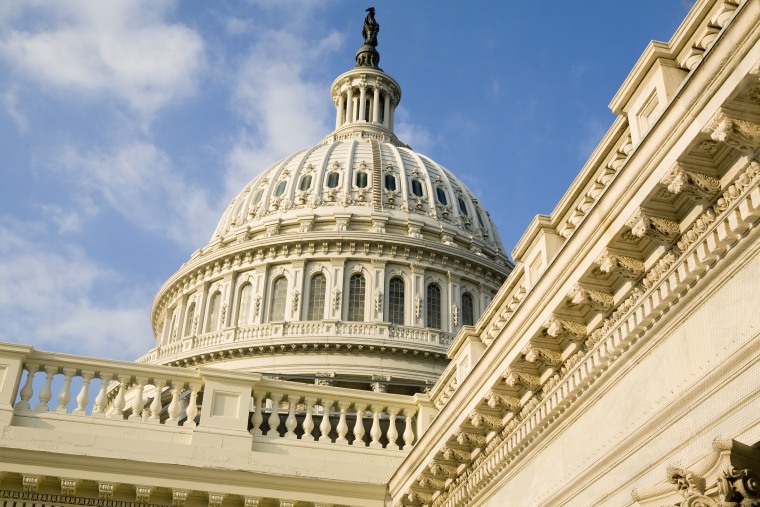WASHINGTON — Following the historic summit Tuesday between President Trump and North Korean leader Kim Jong Un in Singapore, congressional Republicans expressed both measured support and skepticism, while Democrats criticized the president for ceding too much to Kim.
Some top Republicans indicated that they support Trump’s diplomatic efforts, but warned that denuclearization must be "verifiable" — a qualification that did not appear in the agreement signed by Trump and Kim Tuesday — and tended to offer a more critical assessment of North Korean leadership and intentions than the president's more optimistic take.
“I commend the president for not accepting the status quo,” said Speaker Paul Ryan, R-Wis. “As negotiations now advance, there is only one acceptable final outcome: complete, verifiable, irreversible denuclearization. We must always be clear that we are dealing with a brutal regime with a long history of deceit. Only time will tell if North Korea is serious this time, and in the meantime we must continue to apply maximum economic pressure.”
"One more thing about KJU. While I know @POTUS is trying to butter him up to get a good deal, #KJU is NOT a talented guy," Sen. Marco Rubio, R-Fla., tweeted. "He inherited the family business from his dad & grandfather. He is a total weirdo who would not be elected assistant dog catcher in any democracy."
The agreement Trump signed with on Kim Tuesday focuses on pursuing the denuclearization of the Korean Peninsula, and Trump said he had decided to suspend military exercises between the U.S. and South Korean forces for now.
Senate Majority Leader Mitch McConnell, R-Ky., said in a statement that he supports the goals released in the joint statement by the White House, but warned that if North Korea doesn’t follow through, the U.S. and its allies must impose “maximum pressure” on the regime.
“I remain supportive of the administration’s stated position, as Secretary Pompeo has reiterated: The goal of the United States is the, quote, ‘complete, verifiable, and irreversible denuclearization of the Korean Peninsula,’” McConnell said, referring to Secretary of State Mike Pompeo.
Other top Republicans said they were unsure what tangible results the summit had produced.
“While I am glad the president and Kim Jong Un were able to meet, it is difficult to determine what of concrete nature has occurred,” said Sen. Bob Corker, R-Tenn., chairman of the Senate Foreign Relations Committee. Corker later told NBC News’ Kasie Hunt that he wants Pompeo to testify before his committee on the next steps in the process.
Sen. John Kennedy, R-La., criticized the lack of detail and warned that it’s “possible to feed a shark,” but when you do it you have to be “very careful,” while Sen. Lindsey Graham, R-S.C., told reporters that the deal with North Korea is just an “agreement in principle," and "not an agreement that can be enforced.”
Rep. Ed Royce, R-Calif., chairman of the House Foreign Affairs Committee, said in a statement that Kim has “gained much from step one” — and that Congress has an important oversight role to play in the process.
“Throughout, we must press Beijing and others to continue complying fully with all sanctions against the North Korean regime. Kim Jong Un should not receive a dime of relief until he fully and verifiably denuclearizes,” Royce said.
Sen. Chuck Grassley, R-Iowa, told reporters at the Capitol on Tuesday that he’s not convinced that pulling troops out of the Korean Peninsula is the right choice, but offered the proviso that he doesn’t receive the same intelligence as Trump.
Democrats said North Korea had gained far more from the meeting than the U.S. had, with Sen. Bob Menendez of New Jersey, the top Democrat on Senate Foreign Relations, saying that the statement that came out of the summit is the “weakest” he had ever seen “come out of an engagement with North Korea.”
“I think that we have to even change the nature of Ronald Reagan’s 'trust but verify,' to 'we have to verify what North Korea means before we could ever trust them,'” he said.
House Minority Leader Nancy Pelosi, D-Calif., said Trump had handed Kim concessions in exchange for "vague promises that do not approach a clear and comprehensive pathway to denuclearization and non-proliferation."
“In his haste to reach an agreement, President Trump elevated North Korea to the level of the United States while preserving the regime’s status quo," Pelosi said.
Sen. Dianne Feinstein, D-Calif., told reporters that the U.S. did not gain much out of the summit and that she still sees a “clear and present danger in North Korea,” while Sen. Cory Booker, D-N.J., said he “wouldn’t call it an agreement — it looks more like a press release to me.” Senate Minority Leader Chuck Schumer, D-N.Y., said that “what the United States has gained is vague and unverifiable at best — what North Korea has gained, however, is tangible and long lasting."
“It’s clear that Kim Jong Un walked away from Singapore with exactly what he wanted — the pomp, circumstance and prestige of a meeting with the president of the United States — while making no specific commitments in return,” Sen. Mark Warner, D-Va., said in a statement. “Whether this will result in a verifiable agreement to dismantle North Korea’s nuclear weapons program, America and the world will wait to find out."
